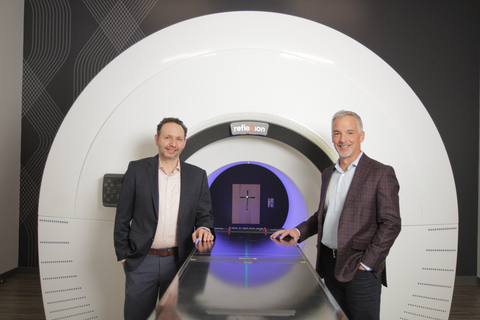HAYWARD, Calif.– RefleXion Medical, a therapeutic oncology company, today announced the U.S. Food and Drug Administration (FDA) has granted the first marketing clearance for its SCINTIX™ biology-guided radiotherapy, a cutting-edge treatment applicable for early and late-stage cancers. The company will host a live-stream event featuring both its co-founder and CEO discussing the breakthrough significance of SCINTIX therapy for cancer treatment.
SCINTIX is the first and only radiotherapy that allows each cancer’s unique biology to autonomously determine where and how much radiation to deliver, second-by-second, during actual treatment delivery. This expands the RefleXion® X1 into the only dual-treatment modality platform that can treat patients with indicated solid tumors of any stage. The SCINTIX biologic modality tracks tumor motion from all types of movement, including expected motion from internal processes such as breathing and digestion or unexpected movement by a patient. The X1 also has a state-of-the-art anatomic modality previously cleared by the FDA for solid tumors located anywhere in the body.
“SCINTIX ushers in a new era of external-beam radiotherapy by harnessing data produced from the biologic process of cancer cells, which until now has been untapped,” said Terence Williams, M.D., Ph.D., chair of City of Hope’s Department of Radiation Oncology. “We are excited to be among the early adopters of SCINTIX and to help develop this therapy for all cancer patients, especially those with stage 4 disease, where treatment options often remain very limited.”
“With SCINTIX, the X1 machine and the tumor communicate continuously via a live data stream produced during patient treatment,” continued Dr. Williams. “This precision should enable us to treat less surrounding tissue and may enable the treatment of more tumors in the same course of therapy.”
The FDA cleared SCINTIX biology-guided radiotherapy to treat patients with lung and bone tumors. These tumors may arise from primary cancers or from metastatic lesions spread from other cancers in the body. Previously granted Breakthrough Device designation by the FDA for treating lung tumors, the breakthrough nature of SCINTIX technology lies in its ability to detect and then treat multiple moving tumors. Initially cleared for use with the radiopharmaceutical fluorodeoxyglucose F 18—commonly known as FDG—the company plans to adapt SCINTIX therapy to work with the full array of novel radiopharmaceuticals under development for different cancer types.
“From its inception, the novel nature of SCINTIX therapy demanded that we fundamentally rethink how to design a machine capable of delivering cancer treatment to patients that were not considered candidates for radiotherapy because of the extent of their disease,” said Todd Powell, CEO and president of RefleXion. “Likewise, our regulatory pathway encompassed unprecedented hurdles as medical device and pharmaceutical teams within the FDA worked together to create a new classification regulation for this breakthrough device and therapy.
“With initial clearance for SCINTIX therapy behind us, we will begin full commercialization and patient treatments in the coming weeks.”
SCINTIX therapy (formerly referred to as BgRT) is delivered through the RefleXion X1 machine, which combines positron emission tomography (PET) with a linear accelerator (LINAC) to deliver a radiation dose that tracks the cancer’s motion. Immediately prior to treatment, the patient is injected with a radiopharmaceutical that interacts with cancer cells to produce signals or emissions. The X1 continuously constructs a map from the detected emissions data that determines where to aim beamlets of radiation. This crosstalk between the tumor and the X1 requires the system to rotate at 60 rpm—making it the first and only radiotherapy machine to spin at this speed.
“Autonomous radiotherapy was just a concept over a decade ago, but now for the first time in the history of cancer treatment, the individual biology of the cancer itself guides its own destruction,” said Sam Mazin, Ph.D., founder and CTO of RefleXion. “Today, I want to acknowledge and thank the many talented people who have contributed over the years to translate SCINTIX therapy to the clinic.”
Combined, tumors in the lung or bone, including those that metastasize from other primary cancers, arise in approximately 430,000 patients.1 In metastatic cancer, where patients can present with both lung and bone tumors, radiotherapy is often not considered as a treatment option due to the cumbersome clinical workflow and toxicity of treating more than one tumor in a treatment session.


